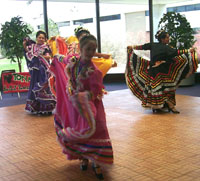Quinstate Program Discusses Hispanic and Latino Issues
Quinstate Program Discusses Hispanic and Latino Issues

A room filled with educators, health care workers, clergy, Anglos and Latinos heard successes and challenges communities face as they look to achieve better understanding among an increasingly diverse population.
John A. Logan College was the site of the April 4 Quinstate Community Development Forum called Las Ayudas, Crossing Cultures and Living With Our New Neighbors. Since 1983, the Quinstate forum has traveled among Kentucky, Illinois, Arkansas, Tennessee and Missouri looking at varying community development issues. Kentucky will host the 2003 event.
Jim Becker, with the University of Illinois Extension Service and event chairman, said this year's topic was the brainchild of Doug Wilson, University of Kentucky Cooperative Extension Service agriculture and natural resources agent.
Wilson said the idea came to him because of what he saw happening in his own community with the increased diversity as people have moved in to work on farms, in restaurant and even in factories.
In recent years he's become more and more aware of the problems these new community members face from language barriers to the unscrupulous actions of others. Much of his knowledge has come through his meeting and working with Tomi Warren, director of the Migrant education program in McCracken County, and Pilar Fondaw, a native of Peru who is the recruiter for Migrant education in the county. The three participated in a panel discussion on educational issues at last week's forum.
"The growth in the Hispanic community is advancing at a phenomenal pace because of tobacco, poultry and vegetable production," he said. "They want the same things in life we do - a better life for their wives and their children."
Warren noted that Kentucky's Latino population is the eighth fastest growing in the country.
In just the rural areas of the quinstate area, the Hispanic population has increased from 35,000 in 1990 to an estimated 152,000 in 2000, while overall population in those same areas has increased by less than 5 percent, according to Roger Beck, an agricultural economist at Southern Illinois University Carbondale.
Beck said the key to survival and economic revival of rural communities is going to depend on this group.
"The growth of the Latino population has breathed new life into rural communities," he said. "Increasingly they are going from agricultural jobs to many occupations." Wilson became the UK contact to Quinstate about a decade ago. The meetings have varied over the years and have gone from two-day to one-day events. Quinstate includes the five northern most states that bordered on the Mississippi Delta - Kentucky, Tennessee, Arkansas, Illinois and Missouri. Cooperative Extension Service members from these states thought is was important to get together and share.
"Hopefully something that was working in Kentucky could be adapted to Missouri or vice versa and a lot of that has happened," he said. "I feel like we are all our brother's keeper and believe in Extension we have a unique role through these connections. If someone else has a success story, then hey let's take it back to Kentucky and use it, and we heard one today."
Wilson was referring to Steve Scates, a grain and vegetable producer near Shawnteetown, Ill., who has integrated education, health, recreation and housing into his workers day-to-day lives.
Scates converted an old high school into housing for his 30 to 80 workers while maintaining the gym and outdoor ballfield. Mostly single, young men live there but there are a few families with apartments in the building, he said. It does create some problems having that many single, young men together but no more than putting 60 young men from anywhere in the community in one place, so it works out, he said.
"It has worked out well for us, it is not the cheapest form of labor for us but it is a good, effective, professional labor force for us. With vegetables they have to know what to do and how to take care of them."
Access to health care and education were two issues discussed at the conference and two areas Scates has addressed by having classes for his workers and health clinics. Housing issues and simple day-to-day living were also a part of the daylong meeting. Joan Martin, Grayson County Extension agent for family and consumer sciences, said she gained some valuable knowledge from the day's program.
"I was very interested in learning more about what it was like to be a minority in the United States and how to work with people from the Hispanic/Latino culture," she said. "I'm also preparing a lesson for our area Extension Homemakers clubs for next year about Mexico and my understanding of what was wanted was not so much of a travelog, food oriented approach but how can we welcome these families into our communities and show them we want them to be here."
